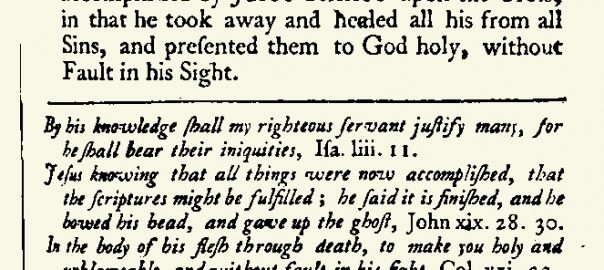NB: This is an updated version of an earlier post on Samuel Richardson.
Samuel Richardson was an English Baptist. Richardson was one of the formative leaders of the early Particular Baptists as he with eleven others signed the 1644 and the 1646 London Confessions of Faith. He seems to have been from Northamptonshire, northwest of London and “a substantial London tradesman and was certainly one of the shrewdest and most influential of the Baptist leaders in London.” He was an advocate for religious liberty and supporter of Oliver Cromwell.
Richardson defended Baptist practices and a radicalized version of the reformed monergistic belief that justification and salvation happen exclusively by the grace of God in Christ. From Tobias Crisp he derived the belief that we are justified by Christ alone – before we believe. Justification is fully achieved on the cross and never depends on human faith or works. These can only be considered as results of God’s work in Christ as the Holy Spirit works in those who are justified. We are justified by Christ alone and not by our believing. Faith is an evidence of “interest in Christ but not a joint-partner with Christ”, says Richardson. When we are said to be justified “by faith” this should be understood as saying that we are justified by the object of our faith, i.e. Christ, and not our own subjective faith. Faith is, says Richardson, “put for Christ”.
In his tract Justification by Christ Alone from 1647, Richardson wrote:
“[W]e grant God has decreed the end and the means, and whatsoever God has decreed shall unavoidably come to pass. But we deny that faith is any means of our Redemption, Justification, or Salvation. Nothing but the Lord Jesus Christ is the means of our salvation. There are means that are necessary to the revealing and enjoying the comfort of it, as the Holy Spirit and ministers to reveal it and faith to receive it; also, there be fruits and effects of the love of God, as faith, love, and obedience to Christ…yet these are no means of our salvation.”
Faith is not condition of justification, but a sign or manifestation of justification. In fact, Richardson comes close to defending the later idea of Justification from Eternity that is often associated with later (particular) baptists like John Gill.
Moreover, since the justification of the sinner is not a product of that person’s faith or obedience to the gospel, but of Christ alone, Richardson would also be critical of the obsession with the experiences of guilt that was to lead the sinner to conversion. Richardson, like Crisp, was accused of being Anti-Nomian, as both diminished the role of the law in the justification of the sinner. If people are justified by Christ alone, the conversion that comes from a sense or feeling of sinfulness cannot be a condition for justification. As Richardson puts it: “if you mean by sense, the feeling of horror and terrors for sin, if you desire such a sense of sin, we do not wish it you; we wish you not to fetch your comfort from your sense of sin, tears, or crying, but only and alone from God’s free grace in Christ.” Similar views are expressed in the baptists’ First London Confession from 1644, when it says that the “terrors of the law” are in no way required for the sinner to receive Christ, while faith is said to be the “manifestation” of justification (§25; §28).
In 1658 an unnamed author released a book entitled entitled A discourse of the torments of hell: The foundation and pillars thereof discovered, searched, shaken and removed. With many infallible proofs, that there is not to be a punishment after this life for any to endure that shall never end. An edition of the book from 1660 says S. Richardson on the title page. In John Brandon’s To Pyr To Ainon (1678) the author was identified with the baptist Samuel Richardson.
The book Of the torments of hell defends the view, that ‘hell’ does not mean an endless state of torture after death. Though the author sometimes seems to defend the idea that the godless will be finally annihilated (especially in the first parts of the work), the author would eventually argue that all will finally be saved. Whether the identification of the author with the baptist Samuel Richardson is correct may perhaps be mostly of interest only to baptist historians, but it is interesting that an early baptist may have held universalist beliefs.
Of course, this was a common name, so the identification may not be entirely sure (also, there are some differences in method: the baptist Samuel Richardson argues mostly from Scripture, while the unknown author of the book on hell argues from a great number of authorities). If the author is indeed identical to the baptist Samuel Richardson, this would make him a good example of a forerunner of the Primitive Baptist Universalists.
Read more about Samuel Richardson here.
